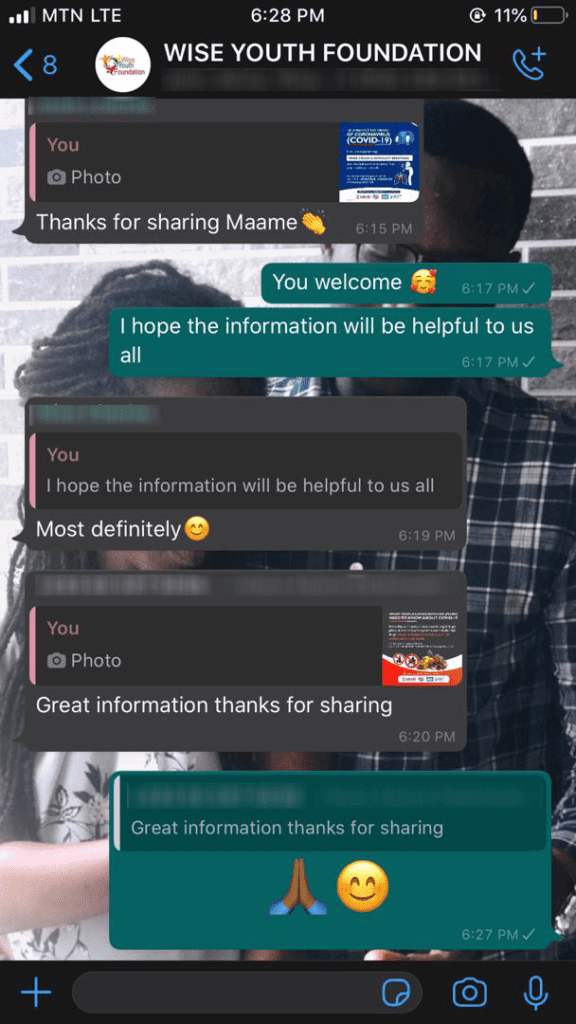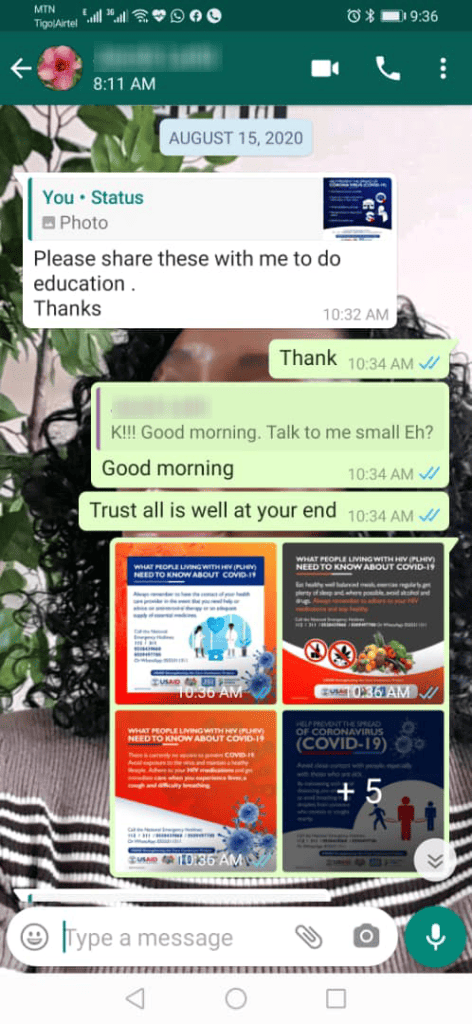Ghana’s HIV Counseling Service Pivots to COVID-19
August 27th, 2020 | story
Ghana’s first two cases of COVID-19 were confirmed on March 13, 2020, and the country’s confirmed cases as of August 26, 2020, were 43,769 with 270 deaths, and 42,042 recoveries. The Ghana Health Service has urged the general population, people living with HIV (PLHIV), and key populations (KP) to strictly adhere to recommended preventive measures. Equally important is the need to debunk misinformation and provide access to timely, life-saving, and credible information. In Ghana’s Western Region, PLHIV, men who have sex with men (MSM), female sex workers (FSW), and other key populations (KP) continue to face stigma and discrimination (S&D) resulting in social exclusion and low utilization of healthcare services. S&D is now becoming a problem for COVID-19 patients in the region, which will likely further exclude KPs from accessing COVID-19 safety information and general healthcare.
To ensure the general population, PLHIV, MSM, FSW, and other KPs have access to credible information to prevent COVID-19 infection, the USAID Strengthening the Care Continuum Project is leveraging its Healthy Living Platform (HLP) to reach residents of Ghana, and in particular, in the project’s focus area, Ghana’s Western Region. The region has been identified by the Ghana Health Service (GHS) as a COVID-19 hotspot with 2,948 confirmed cases as of 26 August 2020.


Discussions on the COVID posters and information developed by USAID Strengthening the Care Continuum project.
The HLP is an interactive two-way system that transmits short messages, interactive voice responses, and is integrated with helpline counseling, all accessible via a three-digit shortcode on major telecommunication networks in Ghana. Users have access to professional counselors (nurses) who provide private, confidential phone advice as an entry point to the HIV care continuum. The platform currently runs three campaigns (“It’s My Life,” “I’m Someone’s Hope” and “It’s My Turn”) in four local languages (Twi, Ewe, Ga, and Hausa) and English. Two new campaigns will be added within the next month, namely: “Be Yourself” and “Make the Change.” The HLP currently has more than 45,000 users and has had over 640,000 interactions since August 2018.
With COVID-19 safety protocols including “stay at home as much as possible”, the HLP pivoted to also include information about COVID-19 to enable people to have access to timely and rapid information on COVID-19, HIV and general health tips. The helpline counselors provided information on HIV, AIDS, COVID-19, and general health tips to subscribers and the Project developed key messages around COVID-19 prevention and treatment following national guidelines. From 1 March to 26 August 2020, already during the COVID-19 pandemic in Ghana, the HLP serviced over 10,000 new users with an average engagement time of three minutes and 31 seconds, and 2,014 counselor interactions. In order to provide accurate information, our HLP counselors received training from JSI’s clinical team and were provided with a FAQ tool (Frequently Asked Questions). The FAQ tool was adapted from the WHO and GHS and comprised three sections: Q&A on COVID-19, Q&A on HIV and COVID-19, and responses to myth and misinformation on COVID-19.
The counselors responded and continue to respond to COVID-19 questions, including:
The Project also developed social media posters and disseminated via our civil society organization (CSO) partners, HIV peer educators, HIV case managers, and front line health staff. The posters are facilitating great discussions on various platforms, especially WhatsApp groups, which are widely used by Western region residents. People also use posters as their social media profiles.
Some of the posters developed and disseminated via social media channels.
The Maritime Life Precious Foundation, a CSO partner, said: “The posters are raising conversation on COVID-19 and helping the KP community know the relationship between COVID-19 and HIV. Some people are even asking whether we are implementing a COVID-19 project.” Put differently by another CSO, Hope for Future Generation: “The posters are incredibly powerful in helping PLHIV to know how to avoid being infected and/or prevent the spread of COVID-19 and in particular, remind them to adhere to their HIV medications to stay healthy.”
Another local CSO partner, Life Relief Foundation, said: “The posters are supporting HIV testing services (HTS) at our various HTS Points. It has helped to get the attention of our target population [PLHIVs] and makes it easier to merge education on HIV with COVID-19 education.”
So far, the Care Continuum team has learned that the HLP is an effective system to link KPs to necessary healthcare treatment beyond HIV services. The team also realized that reaching KPs with credible COVID-19 information through the HLP has the potential to eliminate S&D and fear of confidentiality breaches.
We strive to build lasting relationships to produce better health outcomes for all.